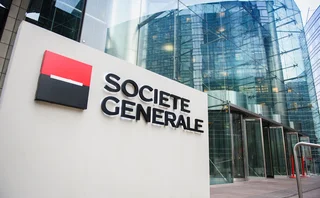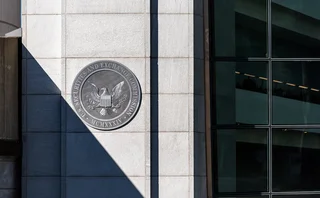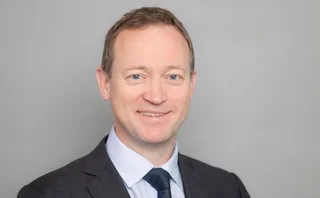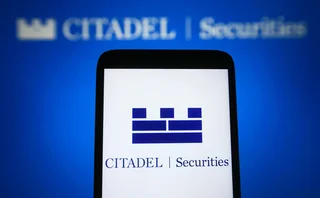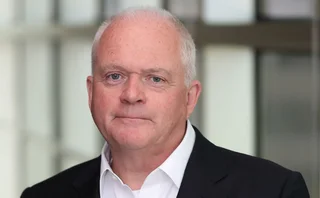
The fraudbuster
Neil Jensen, CEO of Australia's financial intelligence unit Austrac, has pioneered the use of wire transfer data to uncover fraud both within Australia and internationally. Here he talks to Nick Kochan about crimes he has cracked and Austrac's systems for spotting 'dirty money'

When international agencies or financial institutions suspect dirty money has gone through Australia, they turn to Neil Jensen. He is the head of the country's financial intelligence unit (FIU), the Australian Transaction Reports and Analysis Centre (Austrac), and its representative on many international organisations, such as the Egmont Group.
Austrac is at the sharp end of the attack on Asian organised crime. Created in 1988, it is Australia's lead agency fighting money laundering. It has a range of civil and criminal roles, both as financial regulator and police agency. The authority regulates a large number of institutions, including 54 authorised banks (of which the four largest local banks rank in Asia's top 10), money market corporations, credit unions, building societies, friendly societies and finance companies.
Although much of its role is - by necessity - distinctly hush-hush, Jensen is prepared to reveal that Austrac played a key part in breaking a ring of Chinese 'snakeheads' who funded a people-trafficking operation that left 20 Chinese asylum seekers dead in Dover in the UK.
"We used our wire-transfer system to detect some drug-related activity between Hong Kong and Australia. The Hong Kong authorities detected another range of transactions coming into Hong Kong from England. We found that a drug-related activity was also a people-trafficking-related activity. The most significant part was the trafficking of people to England. Our involvement wasn't disclosed, but the heads of the snakeheads were prosecuted and convicted in Hong Kong."
Austrac's powerful database of international wire transfers was critical to the discovery of the links, and the UK authorities came out to Melbourne, where the organisation is based, to say 'thank you'.
Financial investigation is in Jensen's bones. Trained as a lawyer, he came up through the ranks of government service. He worked in Australia's Competition Commission as an investigator, checking out monopolistic practices and abuses. He joined Austrac in 1992 as second in charge and showed an early insight into anti-money laundering (AML) tools.
In a visit to the US that year to assist American prosecutors with a high-profile investigation, he saw the value of a system for reporting international wire transfers. He went straight back to Australia and persuaded his bosses to implement it. This took Australia ahead of the field in data collection and analysis. Jensen is very proud. "My claim to fame was to introduce the reporting of wire transfers, an extremely significant part of the work we do. We were funded to get electronic systems in place to get a lot of data, and we could analyse the data with IT. If you have more data, it is easier for the software packages to work on it. That gave us a distinct advantage over every other FIU in the world."
Data collection and analysis are critical to the detection of organised crime groups, he says. "We have developed technology for the reporting entities so they can transmit information straight into our database. This has given us the impetus to apply analytical techniques so we can follow trails not only within Australia, but also into and out of Australia."
Austrac receives annually some 2.5 million reports on significant cash transactions and some 13 million reports on international funds transfers. It says that about 25,000 of these are regarded as suspicious. The Serious and Organised Crime Agency, the equivalent UK agency, receives about 250,000 suspicious activity reports a year.
Fraud was the greatest source of the A$3 billion laundered through Australia last year. Illicit drugs contributed some 10% of the total. "The laundered money was most frequently invested in real estate, gambling and luxury goods. Money laundering to, from or within Australia is characterised by the frequent use of structured transactions to avoid reporting requirements, accounts in false names and cash smuggling. It is likely that launderers frequently used cash and wire transfers to effect money laundering involving Australia."
Jensen says that Austrac uses "sophisticated analytical tools such as geo-coding and text mining, in addition to monitoring the changing nature of money laundering and terrorism financing".
International collaboration forms a key part of Austrac's brief. "We share our information with a range of entities overseas in our efforts to track down transnational organised crime and terrorist financing. We work with FIUs and law enforcement overseas. There have been many international investigations resulting from our information. That information is used in a partnership with global law enforcement agencies and private sector entities."
Australia's strategic position on the Asia-Pacific rim exposes it to terrorist risk, and bombings in Bali over the past few years have brought Jensen and his team into the spotlight. Eighty-eight Australians were killed in 2002 when a bar was blown up. Four more Australians were killed by Jemaah Islamiya devices in 2005 when the island was attacked again. Jensen says: "Bali was a significant event, but any terrorist act is a significant event. It is important to eradicate it and that process occurs by following the money trail."
Jensen says Austrac came under pressure to tighten its AML controls after the first Bali outrage. "Identifying relevant financial networks was seen as the best way to stop the funding of terrorist activities. Austrac and other overseas FIUs have responded by sharing financial intelligence, which has allowed FIUs to trace money trails across international borders. This process makes it more difficult for those engaging in money laundering and the financing of terrorism to use complex international money transfer networks to hide the laundering of criminal funds or to siphon legitimate funds for use in terrorist acts."
One consequence of these outrages was the passing of Australia's Anti-Money Laundering and Counter-Terrorism Financing Act 2006. The new law brings Australian AML systems in line with European and US requirements for customer due diligence and enhanced due diligence of specified clients, including politically exposed persons.
In addition, every large financial entity covered by the Act has been required to report an analysis of its compliance with the law to Austrac by the end of March this year, providing the first assessment of Australia's AML systems and observed by many international agencies. The reports required disclosure specifically about correspondent banking, electronic transfer instructions, risk awareness training for employees, awareness and understanding at the board and senior management level, and other topics. Also required is an independent review of the reporting firm's AML programme.
Jensen says the submitted compliance reports will demonstrate to Austrac that an entity is identifying and mitigating the risks of its business being used for money laundering or terrorism financing. He adds that Austrac will also be looking to ensure these reporting entities have allocated adequate resources and have unlimited controls, reporting lines, communication protocols and processes for review.
As a result, Australian financial services firms either had to have their AML and 'know your customer' programmes in place by December 2007, or else be able to show they are making progress and have implementation plans firmly arranged.
Jensen says fighting money laundering is a "partnership" between firms and Austrac, and has spent a lot of time doing the rounds of the Australian financial community, spreading the message of the new Act. "Our approach is based on education, consultation and seeking voluntary compliance. We are trying to give the entities as much information as possible. We want to help them as much as we possibly can to put the programme into place and maintain the programme. It is no good having the programme and not doing anything about it."
He has addressed numerous industry bodies and associations to ensure understanding and compliance. But if people do not comply, they face tough consequences. "We have also been given some strong powers, and the government will expect us to use those powers if we need to enforce compliance," says Jensen.
The legislation was introduced in two stages. The first stage involved compliance by the large financial firms and banks. The second stage brings smaller companies and firms, including lawyers, accountants and real estate agents, into the net. These firms were given more time to assimilate the messages and prepare for the new systems as they had further to go in introducing AML measures. But a number of these are vehemently resisting Jensen's efforts. Lawyers are likely to fight hardest. They have seen how their counterparts in the US, Canada and the UK have fought with varying degrees of success to resist intrusions on legal privilege and customer confidentiality. Jensen is braced for the fight. He says the implications for client confidentiality should not be exaggerated. "The previous government had indicated that the legislation would not affect legal or professional privilege. The new government has the same opinion."
Other targets such as real estate agents and accountants might take some time to implement the legislation, but their lobbying efforts do not match those of the lawyers. Garry Gill, a partner with KPMG in Sydney, says: "The property agents will struggle as they have never been regulated for money laundering. They won't have any procedures or processes in place to deal with it. Behind the scenes, their industry bodies are lobbying like crazy to have the thing watered down or removed altogether. But that won't happen."
Accountants are more up to speed with AML requirements, as many will have sought to make a business out of advising others of their obligations. Austrac doesn't want a fight with the profession. Jensen says: "Our relationship with the financial sector is very strong. There will be issues when it comes down to the cost of implementation. Members of the industry have sat around a table with us and we have listened to what they have said. We drafted the rules in a way that they would work with them. It wasn't just an issue of saying: 'Here's the programme and this is what you are going to do'. It's much more a case of: 'Here's the programme, how can we best do it, with regard to minimising the cost for you and ensuring the deterrence and the follow-on actions that are necessary?"
David Jacobson of Jacobson Consulting warns that Jensen has an iron fist lurking in his velvet glove. "Sooner rather than later, we'll see these powers being used in appropriate cases," he says, adding that it would be a mistake for people to interpret Austrac's light approach so far as a sign of regulatory weakness. "At this stage Austrac is taking a fairly 'softly-softly' approach but it's backed up with significant powers if the regulator needs to use them."
Jensen is also vice chairman of the Egmont Group of Financial Intelligence Units (EGFIU). When he is not pushing and cajoling his reporting entities to implement AML standards, he is quietly encouraging fellow investigators who are members of the EGFIU to upgrade their information collection and analytical systems. Speaking from a secret Egmont conference in Santiago, Chile, he said that Egmont provides a close-knit network of regulators across the globe that ensures co-operation between authorities and uniformity of standards. "When a regulator in one jurisdiction encounters a criminal grouping or suspicion, all he has to do is email a colleague with the information." Jensen is also concerned to impress on his FIU colleagues the importance of passing and implementing tough legislation to counter terrorist financing.
Networks and relationships are extremely critical to fighting transnational crime groups and Jensen says Egmont enables communication to take place in confidence. He also heads Egmont's Training Working Group, which is developing a database of 'sanitised cases' to assist FIU investigators. "There is a great dearth of case material. We are working on developing anonymous typologies for display on the public Egmont website. Money-laundering law is all about deterrence. It is no good waiting until the money has slipped through the net or the terrorists have committed their outrage. Governments must act, and banks must implement and apply systems before the bad men strike."
Jensen has established himself as a renowned advocate of global standards and local compliance. In a field with many speakers but few performers, he stands out as one who has done both successfully.
Biography
Neil Jensen has been chief executive officer of Austrac since September 2002. He was appointed for a second four-year term starting September 1, 2006.
He is co-vice chair of the Egmont Committee and chair of the Training Working Group in the Egmont Group of Financial Intelligence Units (FIUs), the international consortium comprising 106 member FIUs. Jensen is also Australia's head of delegation to the Asia/Pacific Group on Money Laundering, comprising 36 member jurisdictions.
He was awarded the Australian Public Service Medal in 1995 for his contribution to Australia's anti-money-laundering programme.
Before joining Austrac, Jensen investigated restrictive trade practices with the Australian Competition Commission over a period of 14 years.
Only users who have a paid subscription or are part of a corporate subscription are able to print or copy content.
To access these options, along with all other subscription benefits, please contact info@risk.net or view our subscription options here: http://subscriptions.risk.net/subscribe
You are currently unable to print this content. Please contact info@risk.net to find out more.
You are currently unable to copy this content. Please contact info@risk.net to find out more.
Copyright Infopro Digital Limited. All rights reserved.
As outlined in our terms and conditions, https://www.infopro-digital.com/terms-and-conditions/subscriptions/ (point 2.4), printing is limited to a single copy.
If you would like to purchase additional rights please email info@risk.net
Copyright Infopro Digital Limited. All rights reserved.
You may share this content using our article tools. As outlined in our terms and conditions, https://www.infopro-digital.com/terms-and-conditions/subscriptions/ (clause 2.4), an Authorised User may only make one copy of the materials for their own personal use. You must also comply with the restrictions in clause 2.5.
If you would like to purchase additional rights please email info@risk.net
More on People
People: JP Morgan’s data and AI move, Eurex clearing chief, and more
Latest job changes across the industry
JP Morgan AI research founder and head departs
Manuela Veloso leaves as bank announces greater spend on tech and AI
SocGen’s head of US Treasury clearing preparations to depart
Bank’s head of product for FX and fixed income prime brokerage for the Americas set to leave later this month
People: You’re fired! US agency rejig, new CROs at ING, StanChart, and more
Latest job changes across the industry
SocGen’s PB clearing head departs for SwapAgent role
Jamie Gavin takes external consulting role for LSEG’s non-cleared swaps platform
Robertson leaves Barclays’ prime services in New York
Head of prime derivatives services unit departs after seven years with the bank for Carbon Point
Citadel Securities hires former Eisler CRO
Pregnell joins market-maker after demise of hedge fund
People: Fishwick hands over BlackRock CRO role, Citi expands Asia FX team, and more
Latest job changes across the industry


